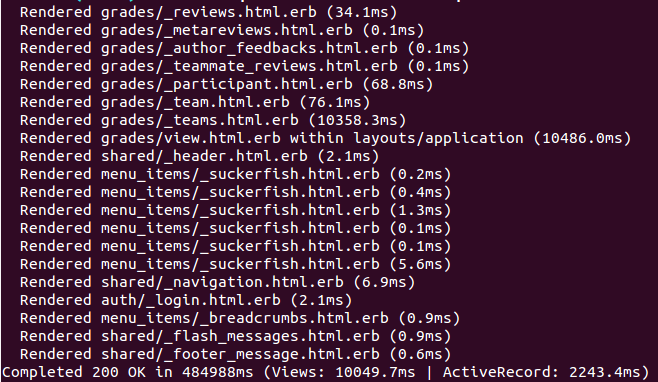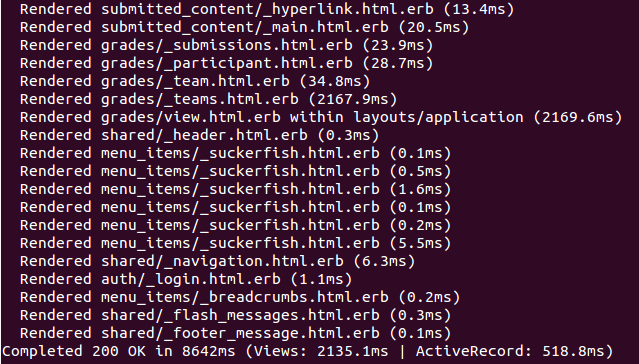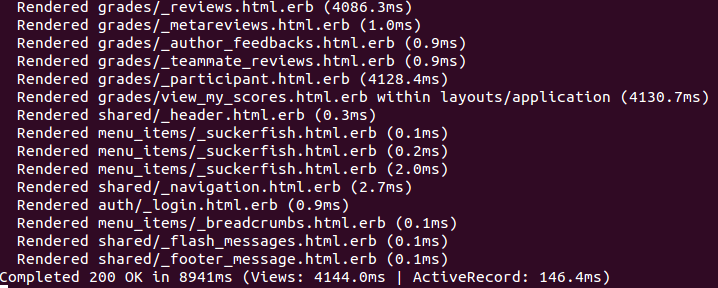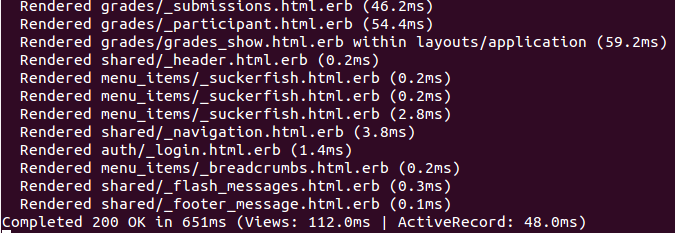CSC/ECE 517 Fall 2014/OSS E1466 gjf
E1466: Refactoring GradesController
This wiki deals with our implementation of a controller in expertiza: grade_controller for the Expertiza Project using Ruby on Rails.
Introduction
Expertiza is a web application where students can submit and peer-review learning objects (articles, code, web sites, etc). It is used in select courses at NC State and by professors at several other colleges and universities.
Project Description
Classes involved: grades_controller.rb
What it does:
This class lists the grades of all the participants for an assignments and also their reviews. Instructor can edit scores, calculate penalties and send emails for conflicts.
What needs to be done:
- Modify calculate_all_penalties method which is too complex and long.
- Put the get_body_text method in a mailer rather than in the grades_controller.
- Refactor conflict_nofication method to conflict_email and make it delegated to the mailer.
- Refactor view_my_scores method to grades_show and delete the unnecessary variables.
- Try not to query for reviews and meta reviews in grades_show method.
Code Modification
calculate_all_penalties Method
Summary
We have modified the calculate_penalties method and implemented all the functions it originally has. After our modification the method shrinks from 45 lines to 32 lines of Ruby code. Originally, the method includes a lot of unnecessary if and unless statements which makes the method uneasy to read and seems to have a difficult logic to calculate the penalties.
According to the codeclimate which calculate the complexity of the method, originally, it has a complexity of 85, however, after we modified it, the complexity goes down to 65. Please check at original version,modified version
We have done the following to the original methods:
- Used for loop with selective choice to create penalty attributes and put it into the CalculatedPenalty Table, instead of duplicating the almost same code.
- Used Object-Oriented Design patterns of Ruby: let the array respond to the method min which returns the minimum number in the array and get the logical penalty other than using if statement.(max_penalty if total_penalty is larger than max_penalty, total_penalty if total_penalty is smaller than max_penalty)
- Eliminated the unnecessary if statements to make the code clear to read.
Implementation
- Modify if statements:
Before Refactoring:
if(penalties[:submission].nil?)
penalties[:submission]=0
end
if(penalties[:review].nil?)
penalties[:review]=0
end
if(penalties[:meta_review].nil?)
penalties[:meta_review]=0
end
After Refactoring:
penalties[:submission] = 0 if penalties[:submission].nil? penalties[:review] = 0 if penalties[:review].nil? penalties[:meta_review] = 0 if penalties[:meta_review].nil?
- Using Objected-oriented Pattern
Before Refactoring:
if(@total_penalty > l_policy.max_penalty)
@total_penalty = l_policy.max_penalty
end
After Refactoring:
@total_penality=[l_policy.max_penalty,@total_penality].min
- Using loops rather than duplicate same code
Before Refactoring:
penalty_attr1 = {:deadline_type_id => 1,:participant_id => @participant.id, :penalty_points => penalties[:submission]}
CalculatedPenalty.create(penalty_attr1)
penalty_attr2 = {:deadline_type_id => 2,:participant_id => @participant.id, :penalty_points => penalties[:review]}
CalculatedPenalty.create(penalty_attr2)
penalty_attr3 = {:deadline_type_id => 5,:participant_id => @participant.id, :penalty_points => penalties[:meta_review]}
CalculatedPenalty.create(penalty_attr3)"
@all_penalties[participant.id] = Hash.new
@all_penalties[participant.id][:submission] = penalties[:submission]
@all_penalties[participant.id][:review] = penalties[:review]
@all_penalties[participant.id][:meta_review] = penalties[:meta_review]
@all_penalties[participant.id][:total_penalty] = @total_penalty"
After Refactoring:
deadline_type=[1,2,5]
penalty_type=[:submission,:review,:meta_review]
if calculate_for_participants
for i in 0..2
penalty_attr={:deadline_type_id=>deadline_type[i],:participant_id => @participant.id, :penalty_points => penalties[penalty_type[i]]}
CalculatedPenalty.create(penalty_attr)
end
end
@all_penalties[participant.id] = {}
for i in 0..2
@all_penalties[participant.id][:penalty_type[i]] = penalties[:penalty_type[i]]
end
@all_penalties[participant.id][:total_penalty] = @total_penalty"
conflict_notification Method
Summary
We refactored the conflict_notification method to conflict_email method. When instructor click the button "email reviewer" whom he thought give a unfair review, the system should be able to send an email to the reviewer automatically.
Implementation
The old conflict_notification action queries an email address list of a certain kind of reviews. In its view conflict_notification.html.erb, A email form contains email list for instructor to choose from and email content.

Before Refactoring, in conflict_notification:
if session[:user].role_id !=6 #Get the instructor email address as sender
@instructor = session[:user]
else
@instructor = Ta.get_my_instructor(session[:user].id)
end
@participant = AssignmentParticipant.find(params[:id])
@assignment = Assignment.find(@participant.parent_id)
Based on submission of review, the action query all the reviewers' email address
#
@questions = Hash.new
questionnaires = @assignment.questionnaires
questionnaires.each {
|questionnaire|
@questions[questionnaire.symbol] = questionnaire.questions
}
@reviewers_email_hash = Hash.new #The email list for instructor to choose from. The process_response method queries the email address.
@caction = "view"
@submission = params[:submission]
if @submission == "review"
@caction = "view_review"
@symbol = "review"
process_response("Review", "Reviewer", @participant.reviews, "ReviewQuestionnaire")
elsif @submission == "review_of_review"
@symbol = "metareview"
process_response("Metareview", "Metareviewer", @participant.metareviews, "MetareviewQuestionnaire")
elsif @submission == "review_feedback"
@symbol = "feedback"
process_response("Feedback", "Author", @participant.feedback, "AuthorFeedbackQuestionnaire")
elsif @submission == "teammate_review"
@symbol = "teammate"
process_response("Teammate Review", "Reviewer", @participant.teammate_reviews, "TeammateReviewQuestionnaire")
end
@body = get_body_text(params[:submission]) #The get_body_text method construct email content aslo in controller
The conflict_notification action requiring another two method "process_response" and "get_body_text" method to get the recipient email list and email content which contributes to extra complexity. The instructor only have to click the button "send email" in conflict_notification.html.erb and turn to send_conflict_email action, then he/she can send the email. If the instructor want to send another email, the process will repeat again,which will be terrible when reloading the "view" scores page.
The quering reiviews actually have done in our show_reviews action, and we can get the individual reviewers' email address.In the reviewer table,we add extra button "email reviewer".Now the instructor could send to reviewer email directly.

After Refactoring:
def conflict_email
if session[:user].role_id !=6
@instructor = session[:user]
else
@instructor = Ta.get_my_instructor(session[:user].id)
end
recipient=User.find(params[:reviewer_id])
participant = AssignmentParticipant.find(params[:participant_id])
assignment=Assignment.find(participant.parent_id)
score=params[:score]
ConflictMailer.send_conflict_email(instructor,recipient,assignment,score).deliver
respond_to do |format|
format.js
end
view_my_scores method
Summary
We refactored view_my_scores method to grades_show, deleted many unnecessary instance variables along with several review and meta reviews methods inside it. Therefore, the system will only search for scores in the database rather than search for scores and reviews, which wastes a lot of time during the grade show process. After refactoring, the complexity on this decreased from 53 to 35. We also optimize get_scores method to improve the efficiency of showing scores by students and instructors, which cost us most of the time during the project. After refactoring this method, the time cost of views in grade controller decreased by 80%.
We have done the following to the original methods:
- Refactored view_my_scores method to grades_show method
- Searched for the key reasons which lead to huge waiting time for getting score
- Refactored get_assessments_for method in response_map.rb and lead to 80% off the current waiting time.
- Eliminated the search for reviews during the grades_show method
- Used Ajax to show and search for reviews for a specific team
- Deleted unnecessary instance Variables
Implementation
- Deleted the unnecessary instance variables
Deleted Code:
@average_score_results = Array.new
@average_score_results = ScoreCache.get_class_scores(@participant.id)
@statistics = Array.new
@average_score_results.each { |x|
@statistics << x
}
- Deleted query for reviews and meta_reviews
Deleted Code:
@average_reviews = ScoreCache.get_reviews_average(@participant.id) @average_metareviews = ScoreCache.get_metareviews_average(@participant.id) @my_reviews = ScoreCache.my_reviews(@participant.id) @my_metareviews = ScoreCache.my_metareviews(@participant.id)
- Modify get_assessments_for method in response_map.rb
After doing this, the time cost of view function decreased by 80% Before Refactoring:
# the original method to find all response
@all_resp=Response.all
for element in @all_resp
if (element.map_id == map.map_id)
@array_sort << element
@test << map
end
end
After Refactoring:
@all_resp=Response.find_by_map_id(map.map_id) @array_sort << @all_resp @test << map
- Adopt Ajax into grades_controller.rb
Add Method:
#show_reviews method gets reviews, meta reviews and author feedback information from server.
def show_reviews
@partial='grades/'+params[:path]
@prefix=params[:prefix]
@score=Hash.new
@score[:assessments]=Array.new
params[:score][:assessments].each do |assessment|
@score[:assessments]<<Response.find(assessment)
end
@score[:scores]=params[:score][:scores]
@participant=AssignmentParticipant.find(params[:participant])
@assignment = @participant.assignment
@questions = {}
questionnaires = @assignment.questionnaires
questionnaires.each do |questionnaire|
@questions[questionnaire.symbol] = questionnaire.questions
end
end
- Add Ajax in views(show_reviews.html.haml)
%h1 Grades#show_reviews
%p Find me in app/views/grades/show_reviews.html.haml
<%= render :partial=>'grades/reviews', :locals => {:prefix => 'user', :participant => @participant, :rscore => @score} )%>
Result
| Name | Before Refactoring | After Refactoring | Reduced By |
|---|---|---|---|
| View all team's score(instructor) | 484988ms | 8642ms | 98.21% |
| View own score(student) | 8941ms | 651ms | 92.71% |
- Original Time for Instructor to View all scores

- Time for Instructor to View all scores after Refactoring

- Original Time for Student to View all scores

- Time for Student to View all scores after Refactoring
